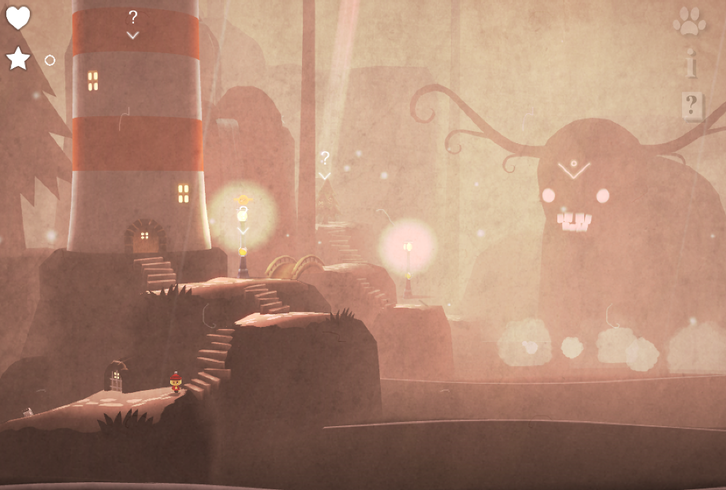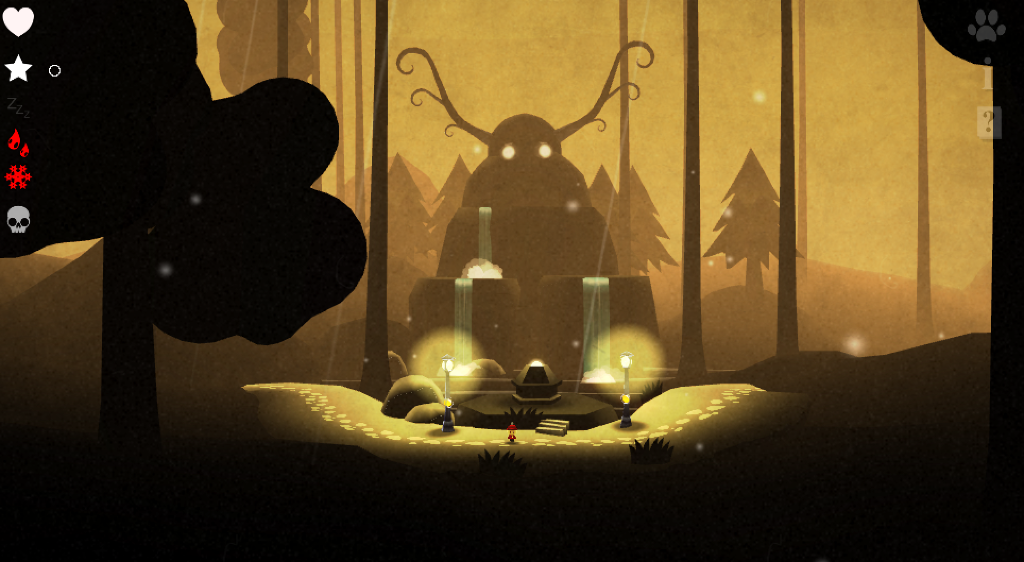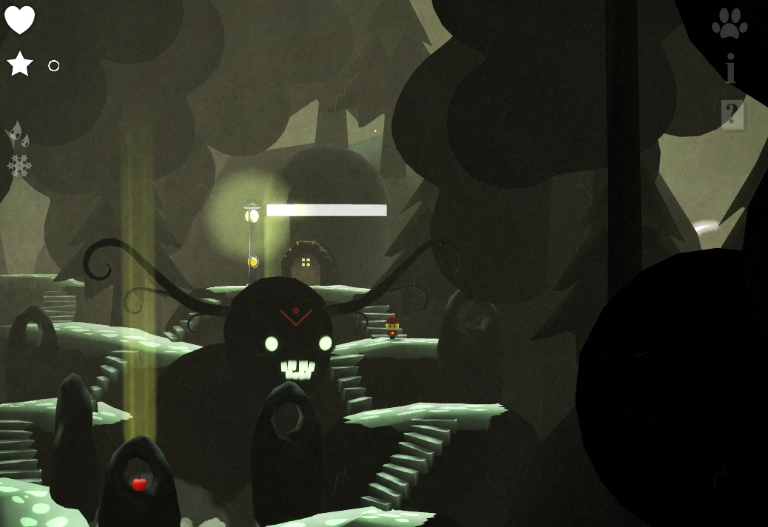|
3D or not 3D Those of you not following on Twitter probably haven't seen much of what is going on with regards to BeMuse's evolving look. In November I made the decision to try and make 90% of the game assets full 3d. One of my aims with the game was to create a world where the interaction of the camera and environment aided the sense of mystery and revelation. A 2d camera (i.e. no rotation - only panning in 2d space) is all well and good, but nothing seems as visually exciting to me as something coming into view that was 'just around the corner' a moment before. This decision has slowed down some asset creation, but it's also refocused me on using shader tricks and simple assets rather than trying to do awesome art myself (which I've historically found difficult) or hiring other people (which always takes a lot more time, effort and nervous energy than you might expect). I'm going to refine the lighthouse islet at some point next week and then see if I can put a little video of the thing moving up here. For now, here are some stills. I'm still not happy with the 'discovery' methods for hidden objects and little stories, so I'm going to rip some stuff out (again). Doubt, Statistics and Magic
I've redoubled my efforts to bring mystery back into BeMuse. My original aim was to create a 'magical space' for experimentation that would sometimes yield results: in this case, opening up more magical spaces for experimentation. The idea was that I would build/generate a ton of rituals which take into account many factors like the state of the moon, what you'd burned in a fire, and so on. This approach raises an issue: any magical activity with a guaranteed result is no longer magical. It is just science - or at worst - mechanics. If cause 100% leads to desired effect then you've eliminated doubt, and thus eliminated mystery. On the other hand, any game activity that has a cost (in terms of scarce resources) without a guaranteed return has the potential to be really annoying. Many games use player clumsiness/skill to add a randomising factor (for example - it's quite possible to play Dark Souls and never get hit - it's just unlikely). Others use doubt and statistics... but then give show overt statistical probabilities to measure success: Damage-Per-Second or Average-To-Hit etc. Players of these games will consider and compare their tools and try to minimax the items they use to better aid them in their struggle. I can't think of a single (modern) game that doesn't give the player all the information he/she needs in order to make an informed decision. With Bemuse, I'm actively trying to stay away from certainty. I'm giving no statistical information. The plan is to leave that to rumour-mongers in the real world. But this approach has an implicit danger and an impact on gameplay. The Fear of Unknown Things If a low-feedback-gamble is an adjunct to the main game (e.g. something like building or picking fruit or whatever) then pure randomness can feel far more comfortable and appropriate ("Hey! I'm making progress in other bits of the game. I don't feel so bad about that bit of gambling I just did!"). In BeMuse, it IS the main game. There is no 'MacGuffin' activity. That's a constant struggle that slows my development right down and keeps doubt sitting on my right shoulder at all times. I keep wasting time trying to think of other activities to lessen the strangeness of ritual behaviour. Alternatively, I lose faith and start making the magic a mechanical toolset. The ultimate issue with a mechanical toolset is that once you know that you feed in a resource and then take steps A, B, C and D to earn your reward, a modern gamer wants those steps to folded together into a single action. E.g. rather than 'Mix ingredients A, B, C and D to create a potion' they want a single button labelled 'Make that potion from A, B, C and D with one click'. This disengages the player from the tactile, ritual behaviour and thus removes the sense of magic from the magic system. But it's also the 'right thing to do' in many circumstances. So, this dilemma is what causes my wheels to spin, my mind to race back to cowardly, well-worn alternatives, and the game to take much longer than necessary. If ever you find yourself wondering why it's taking so long the answer is either 'family illness' or 'this mental minefield'. It's not indifference, laziness or a lack of effort. Thanks for your time.
19 Comments
Cow
1/18/2015 11:21:03 am
I could feel some real pent-up frustration being released in this post...
Reply
Dene
1/18/2015 03:28:47 pm
Frustration? Yes. At other people? Not in the slightest. Just at myself and the two stools I constantly find myself straddling. My aim is still to get community involvement in at an early stage, but cowardice keeps stopping me from doing so. GDC is only a few weeks away. I shall endeavour to get something coherent together by then, as I'd like to release some video at the very least.
Reply
Jon
1/19/2015 01:25:51 am
"Straddling two stools?" Is that a British idiom?
Hannah
1/19/2015 04:56:26 am
I think GDC is a wonderful time to show off your game!
Johnny Money
1/27/2015 06:07:16 am
Cowardice my buttocks! It's like you didn't even write those Incoboto Post-Mortem posts.
My Mind Screams in Agony
1/18/2015 11:37:25 am
I really hate that term, "modern gamer." It makes me think of either the really nerdy asians or the dumpy white people you see in the Nintendo World Store. And I think that you're making kind of too broad a generalization with that A, B, C, D statement. Think about Minecraft. When you craft, there's no recipe menu (in the CPU version, at least). You have to arrange each individual ingredient in your grid every time you want to craft something, and people enjoy that. But you also have the ability to make stuff in bulk, like you generally would in real life (at least when making potions). But say that bulk-making wouldn't apply in some specific case. It's not like people are averse to doing repetitive, boring tasks for a far-off reward. See Cookie Clicker.
Reply
Dene
1/18/2015 03:42:30 pm
By 'Modern Gamer' I mean nothing more than people who have been weaned on finely honed, low frustration, slick, managed experiences - it was not a pejorative.
Reply
Bob
1/18/2015 10:23:12 pm
This is a problem all serial art faces. If, in the 7th season of Buffy the Vampire Slayer, each vampire staking were a huge amount of effort, it'd start being quite dell (or the drama would have to come from elsewhere).
Reply
Ash
1/19/2015 01:29:14 am
Or maybe, like Pokémon, give each ritual a 1/4096 chance to summon a shiny demon
Reply
Ricky H.
1/19/2015 01:41:10 am
You know what I'd like to see:
Reply
Dene Carter
1/19/2015 07:59:32 am
I have 'The House of 1000 Doors'. I think this kind of thing would fit very nicely there.
Reply
Rooby
1/19/2015 11:03:46 am
Let's have full voice acting!
Rooby
1/19/2015 11:05:11 am
That giant demon looks the same in all the pics
Reply
Dene Carter
1/19/2015 11:12:05 am
Currently all the same look. Won't be in final game.
Reply
Rooby
1/19/2015 11:40:47 am
Güd
Calikazam
2/8/2015 02:52:35 am
I want a fruit garden
Reply
Dene
2/8/2015 06:16:04 am
Oh, you know... sometimes, when I am in the darkest grips of madness and malice, I think, "Yes... I should do all those things. Exactly those."
Reply
Ballywhacker
2/8/2015 02:53:41 am
Say, what are those buttons on the side of the screen doing
Reply
Dene
2/8/2015 06:17:17 am
Those are not buttons, but interim 'status change' markers:
Reply
Leave a Reply. |
AuthorFluttermind’s director, Dene Carter, is a games industry veteran of over 25 years, and co-founder of Big Blue Box Studios, creators of the Fable franchise for the XBox and XBox 360. Archives
April 2022
Categories |




